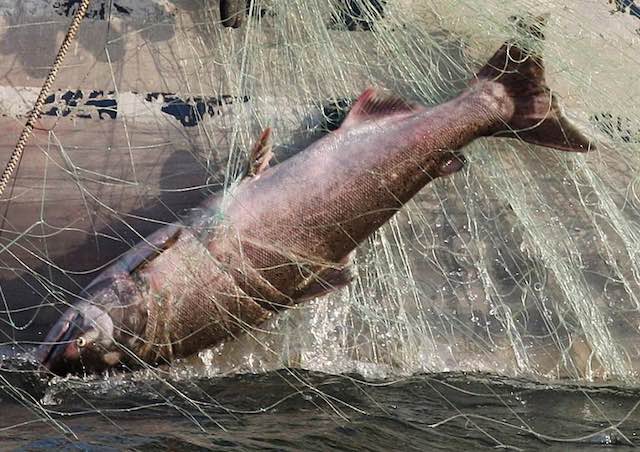forum
library
tutorial
contact

In the Great Debate to Save the Orcas,
the Apex Predator is Missing
by Danny Westneat
Seattle Times, January 4, 2019
|
the film forum library tutorial contact |

|
In the Great Debate to Save the Orcas,
by Danny Westneat
|
Some say we could give our starving whales more food instantly simply by not fishing.
But the idea that the apex predator might need to stand down isn't on the table.
 It's time to call it: We have decided, collectively though passively, to let the Puget Sound orcas go extinct.
It's time to call it: We have decided, collectively though passively, to let the Puget Sound orcas go extinct.
I say this because it should now be obvious to all that the whales are starving to death. The other day this newspaper ran before and after drone images of one whale, K25, that show it to be clearly wasting away. There also was a photo of another whale, J17, with a head misshapen from malnutrition.
They simply need more food. Specifically, they need more chinook, or king, salmon. It's an emergency, which means they need them now.
Yet for all the political talk and the task forces, that one clear goal -- giving the orcas more king salmon to eat immediately -- is the one thing that's not on the menu.
That's because those same fish are on our menus.
"To cut back on fishing is an absolute no brainer, as a way to immediately boost food available for killer whales," says Kurt Beardslee, of the Duvall-based nonprofit Wild Fish Conservancy. "But harvest reductions are essentially not in the governor's task force recommendations. We have a patient that is starving to death, and we're ignoring the one thing that could help feed the patient right now. We're flat out choosing not to do it."
To be fair, the task force that issued 36 recommendations late last year did include two on fishing. One is to follow the Pacific Salmon Treaty, which foresees some minor cutbacks in ocean fishing (up to 12.5 percent) to help chinook. The other is to work on ways to reduce "bycatch," which is when you're trying to land a different fish and instead accidentally catch a chinook.
That's pretty much it. That hardly sounds like the response when an emergency siren is sounding.
"We were successful in getting the target off of our backs blaming fishing," was how a sport-fishing leader summed up the task force to Northwest Sportsman magazine recently.
The plans to improve habitat and reduce pollution to help orcas are great, says Ken Balcomb, of the Center for Whale Research. But they look past the starvation that is happening right now.
"Virtually all of the recommendations have hoped-for results that might appear in the distant future," he said in a minority report (Balcomb was on the task force).
Adds Beardslee: "It's like if you're having a heart attack, your doctor doesn't say: 'You need to go running to get your heart in better shape.' Your doctor gives you emergency aid right away."
Besides culling the other competing predators down the food chain, which is being tried, the only thing we could possibly do to provide the orcas more adult fish right away is to stop fishing for them. Even the controversial proposal to flood the system with hatchery fish would take at least three or four years to start seeing results.
Each year the sport, commercial and tribal fishing industries catch about 1.5 million to 2 million chinook in U.S. and Canadian waters, most of which swim through the home waters of the southern resident orcas. The three pods in question, now totaling only 74 whales, are estimated to need collectively on the order of 350,000 chinook per year.
"It's easy to see how cutting the fisheries' take in half, or eliminating it entirely on a short-term emergency basis, could provide a big boost," Beardslee said. "Bigger than anything else we could do short term."
Doing so, though, would hurt. It would be an experiment. And it's the mother of all "collective action" problems.
It might make sense to, say, take some of the $1 billion proposed by Gov. Jay Inslee for helping orcas and instead pay the various fishing interests not to fish for a year or three. But even if we mustered the political will for that in Washington state, the fish don't stay put. The problem with salmon management is always that if you don't catch it, somebody else will -- in Alaska, or Canada, or by the tribes.
Some Seattle chefs learned this firsthand last summer when, moved by the plight of the orcas, they dropped chinook from their menus. Silly chefs, they were told. The total catch is allocated, so the fish you save won't go to the orcas -- it will be caught and eaten anyway, somewhere up or down the line.
This is exactly Beardslee's frustration.
"When the agencies and the fisheries industries are at the table dividing up the pie, killer whales don't get an allocated piece, they get the crumbs," he says. "That's got to change."
In recent years we've tried everything from killing thousands of fry-eating cormorants to shooting sea lions, in desperate attempts to salvage the whales' food supply.
It's strange, it's only the apex predator that is never called upon to change much of anything.
Related Pages:
Killing Sea Lions Not the Answer by Peter A Conder, Seattle Times, 12/23/18
learn more on topics covered in the film
see the video
read the script
learn the songs
discussion forum
